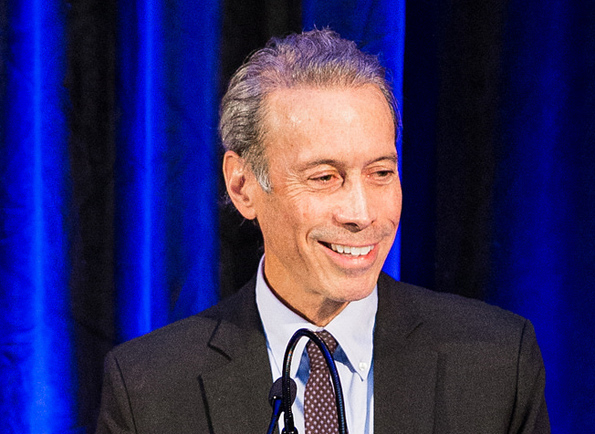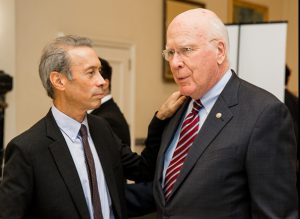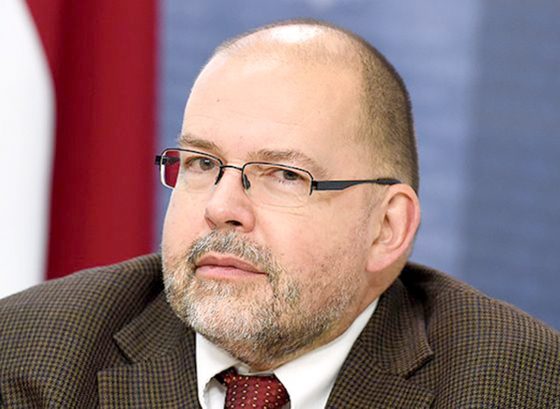“Disagreements between Iran and US Are Only Solvable Through Negotiations,” Says Tim Rieser.

We have been bearing witness to a détente period during President Obama’s terms of presidency between the US and Cuba. The story went as far as after 54 years, the US flag went on to wave in the embassy yard in Havana, the Cuban capital. The reopening of the embassy hosted the US Secretary of State, John Kerry and diplomatic committees from both sides. The very three veterans who had rolled down their country’s flag back in 1961 were present to cherish the rise of the honor. The cut in tensions between the two countries was made possible thanks to two US politicians, Sen. Patrick Leahy and Tim Rieser. Their trip to Havana and their efforts to free Alan Gross, a US citizen jailed in Cuba accused of spying and the result thereof which was his freedom paved the way for the ties between the two countries to bloom once again. Tim Rieser could, in fact, be named among those who played a highlighted role in the new US policies toward Cuba. In an exclusive interview with AVA Diplomatic, Rieser considers the approaches of Iran and Cuba toward the US as different, but believes that negotiation is the key to work out the longstanding tensions and avoid further ones between the officials of Tehran and Washington. He even spoke of making trips to Iran possible on the condition that Iranian officials be open to it.
AVA Diplomatic’s Exclusive Interview with Tim Rieser,
Foreign Policy Aide to US Senator Patrick Leahy
Interview by Mohammadreza Nazari
Is the foreign assistance approach of the U.S. Congress and Senate in line with that of the Obama Administration?
President Obama is a Democrat and the Republicans have majorities in the U.S. Senate and House of Representatives, so while there are areas of agreement there are also big differences. This is a generalization, but President Obama tends to prioritize addressing the underlying causes of instability and conflict such as poverty, injustice and corruption, while the Republicans tend to prioritize strengthening foreign military and police forces. In the Congress, Democrats and Republicans ultimately have to produce legislation the President will sign, so that requires compromise and a relatively balanced outcome.
You played an impressive role in passing and revising a number of laws, including in setting up a victim’s compensation fund for Iraqi civilians killed in the war. What was that article aimed at?
Senator Leahy has long been concerned with the need to help innocent victims of war rebuild their lives, particularly those who have suffered serious physical and mental disabilities. On his behalf, I have worked to obtain funding for humanitarian programs to address the needs of war victims in Vietnam, Afghanistan, Iraq, and around the world. These programs assist injured survivors, the families of those who have died, and they also provide funds to locate and remove unexploded landmines and bombs. Senator Leahy believes we have a moral responsibility to do this and that it in our national interest.
Over the past few years, you have been certainly engaged in many initiatives as an analyst. Which experience do you believe has been the most challenging and significant thus far? In what area has it been? What does it include?
My job working for the Appropriations Subcommittee on the Department of State and Foreign Operations involves funding decisions affecting a wide range of countries, organizations, and programs. One of the biggest challenges is trying to balance the funds we have available in a way that responds to the many needs and U.S. interests around the world. There is never enough money so we have to set priorities and make the best use of what we have. Protecting funding for programs for the world’s most vulnerable people is a priority for Senator Leahy, as is funding for global environmental programs at a time when Republican leaders in Congress oppose it. Working to re-establish diplomatic relations with Cuba was a difficult challenge, fortunately with a good outcome. Senator Leahy has also been outspoken in support of human rights, which is the basis for the “Leahy Law” which prohibits U.S. aid to individuals and units of foreign military and police forces that commit gross violations of human rights. Ensuring that the law is implemented properly is a challenge that occupies a lot of my time.
 In the diplomatic world, you also played key roles including in the détente approach between the U.S. and Cuba. That procedure also led to the exchange of prisoners between the two countries. When did that process start and how did it happen? What was your main role in the talks? Were other members to aid you?
In the diplomatic world, you also played key roles including in the détente approach between the U.S. and Cuba. That procedure also led to the exchange of prisoners between the two countries. When did that process start and how did it happen? What was your main role in the talks? Were other members to aid you?
Senator Leahy and I first traveled to Cuba in 1999, but we began working to obtain the release of Alan Gross and the Cuban prisoners in 2012. It happened because Senator Leahy had long felt that our policy of unilateral sanctions against Cuba had failed, that Cuba posed no threat to the U.S., and that we needed a different approach based on engagement. Senator Leahy and I had many conversations with U.S. and Cuban officials which ultimately led to direct negotiations between the White House and the Cuban Government, the release of the prisoners, and the opening of embassies. Several other Members of Congress were also helpful, and Pope Francis played an important role. Fully normalizing relations will take years, but the two governments are now discussing ways to cooperate on a wide range of issues.
When the talks with Cuba had just initiated, how much did the White House advisors and other U.S. officials support you?
From the beginning, officials in the Obama Administration wanted to see improvements in our policy toward Cuba, but they did not initially seem ready to do what was necessary to achieve the transformative change that Senator Leahy wanted. That did not happen until they recognized that they had to negotiate the exchange of prisoners.
What was the biggest challenge you faced in this process?
I think the biggest challenge was that some officials in both the U.S. and Cuban governments had demonized each other for so long that they refused to recognize that there were larger interests at stake and the people of both countries want better relations.
Does the plan to transfer the Cuban prisoner’s frozen sperm to his wife for the purpose of fertilization indicate that the family of Gerardo Hernandez had lost hope in his freedom?
I don’t think they had lost hope, but Adriana Perez (Gerardo Hernandez’ wife) was 43 years old so she was approaching an age when it would be very difficult, if not impossible, to have a child. Senator Leahy felt it was the humane thing to do, that it did not cost the U.S. Government anything, and that it could lead to improvements in the way the Cubans treated Alan Gross.
How do you see the imposition of the U.S. sanctions on Cuba? How much do you find them efficient?
Senator Leahy and I have long opposed the U.S. embargo against Cuba, which has failed to achieve any of its objectives. While he disagrees strongly with many of the Cuban Government’s policies and practices, he does not believe the embargo is effective.
As an individual who played part in the détente approach between Cuba and the U.S., what similarities and differences do you view with and from the tensions between Iran and the U.S.?
On the one hand, Cuba and Iran have very different histories, cultures and relations with the U.S. Despite our differences and despite the U.S. embargo, because Cuba is located only 90 miles away there has been a lot of interaction, including trade in food and medicines, and cultural, academic and other exchanges between Cubans and Americans during the past 55 years. On the other hand, there are similarities in the way Cuba and Iran have viewed the U.S., and how the U.S. has viewed them, for many years. Each has viewed the other as a security threat. While that is no longer the case for the U.S. and Cuba, it remains a central theme in U.S. – Iran relations. As a result, although we and the Cuban Government disagree strongly on human rights, we now have regular, useful discussions on a wide range of issues. Communication between the U.S. and Iranian governments, however, remains very limited. It is impossible to make ongoing progress on issues of common concern if you do not have a constructive dialogue with each other.
What do you suggest to decrease tensions between Iran and the U.S.? Can the lost trust between the two countries be restored?
Even though our governments will continue to have profound differences – particularly over human rights, terrorism, ballistic missiles, and other issues – I believe relations between the U.S. and Iran can improve. I also believe that large majorities of the people of both countries want it to improve. The JCPOA was a unique achievement, but a lot of distrust remains. We should urgently seek to build on that experience. First we need to change the way we talk about each other. Rather than engaging in hostile rhetoric and name calling that accomplishes nothing, we should recognize that our disagreements can only be resolved diplomatically. We should regularize direct communication between our governments to prevent small problems from becoming big problems, like the recent incident with the U.S. Navy sailors whose boat mistakenly strayed into Iranian territory, and issues like the recent exchange of prisoners. I think we should discuss a road map that could lead to reopening embassies, and seek opportunities to cooperate on economic, humanitarian, and regional security issues.
You went on a trip to Cuba along with Sen. Leahy for the purpose of building trust. Is a similar trip foreseeable to Iran?
I would be interested in doing that if there are officials in the Iranian Government who would receive me for that purpose.
Considering the implementation of the JCPOA, are the Republicans after creating a new glitch in the Obama Administration in this process (the implementation of the JCPOA)?
It is no secret that some Republicans strongly oppose the JCPOA, including some Republican candidates for president who have threatened to withdraw from the JCPOA if elected. But if Iran lives up to its commitments under the JCPOA I think it will be politically very difficult to reverse course. Senator Leahy, and a majority of the American people, believes the JCPOA is a very important, positive step for the U.S., Iran, and the world and he hopes that it leads to further progress on other issues of concern to both countries.




